The UK cities most ready and in need of self-driving cars
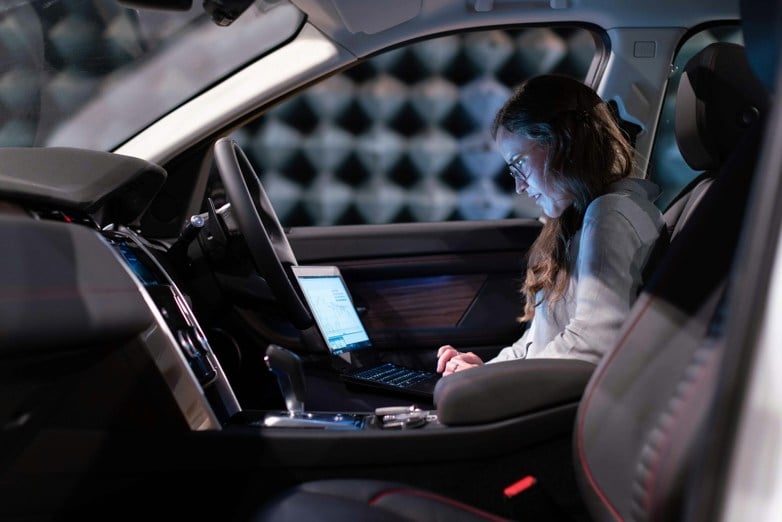
Self-driving cars, once confined to sci-fi fantasy films, are fast becoming a reality. Autonomous vehicles (AVs) are one of the automotive industry's biggest upcomers; with AV technology pilots being fast-tracked in England to spring 2026[1], self-driving cars without a safety driver could hit UK roads.
While many might associate AVs with risk, data shows 94% of crashes are caused by human error[2]. Yet, AVs can react to hazards faster, helping to create safer roads across the nation.
In the UK, the timing couldn’t be more crucial, with driving test backlogs topping 600,000[3], waiting lists stretching to 24 weeks, and being home to some of the most expensive and delayed public transport across Europe.
AVs offer a compelling alternative, with no tests required and no dependence on traditional public transport, self-driving cars are slowly becoming the smarter option for mobility.
Not only could roads become safer, but the AV market is also set to create around 38,000 jobs and add £42 billion to the UK economy by 2035[4].
So, which UK cities need AVs the most, and which are best prepared?
We’ve analysed factors from the number of road collisions per billion miles, mean working hours per week, driving test wait times, and driving test pass rates to reveal the UK cities most in need of AVs. We have also found the cities that are most ready for the change, by analysing gigabit capable broadband, 5G rollout and premises above 30Mbps.
- Wolverhampton is the city most in need of autonomous vehicles, with 660.13 collisions per billion miles
- St. Albans has the UK’s least affordable housing; therefore, residents are moving further from city centres, where AVs could reduce reliance on limited public transport and make commutes more practical.
- Salford workers work the longest week on average (35.30 hours), meaning they would benefit the most from lower commute times due to AVs
- Gloucester has the highest rate of train cancellations in the UK (7.30%), highlighting the need for reliable and direct journeys, offered by AVs
- Kingston Upon Hull is the UK city most prepared for driverless cars, due to 100% 5G rollout
With driverless buses and Ubers arriving as soon as Spring 2026 in the UK[5], we analysed data to find out exactly which UK city needs AVs the most by looking at the current climate of driving in each place.
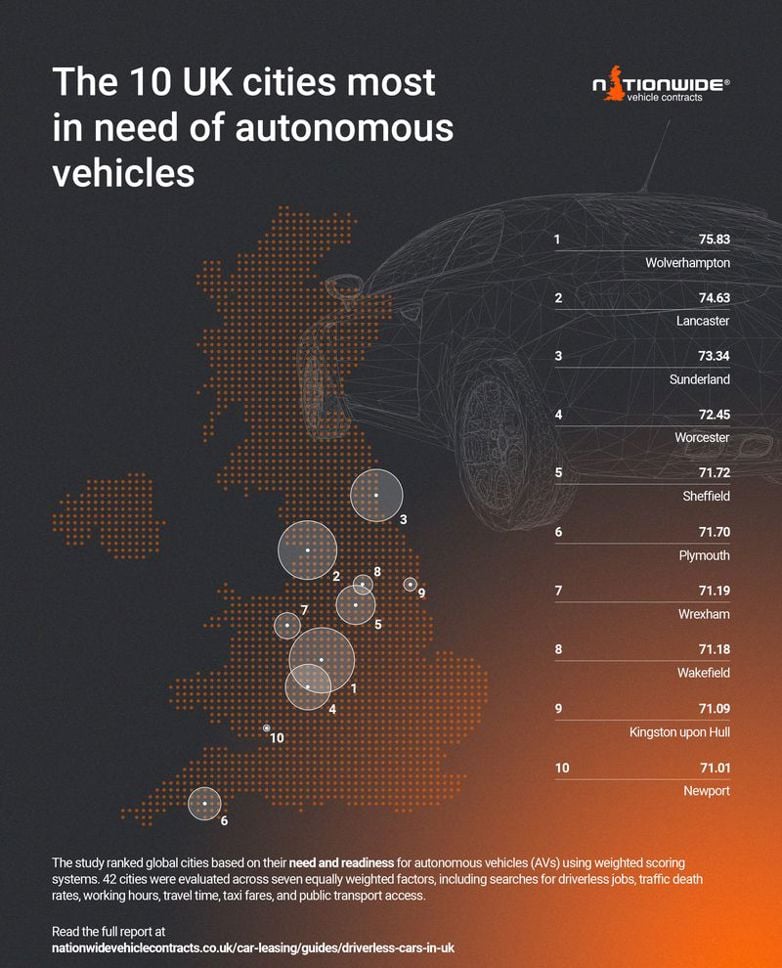
Wolverhampton, near Birmingham, is officially the UK city most in need of autonomous vehicles, with the highest index score of 75.83 out of 100.
The city holds the lowest test pass rate (33.4%) across the UK, highlighting that hopeful drivers are struggling to achieve their licence.
For the ones that do, they face chaotic scenes, with 660.13 collisions per billion miles travelled (almost double that of Lancaster) and the highest mean working hours in the top ten (33.9), meaning a flurry of commuters during rush hour.
You can expect roads here to be full of frustrated commuters, which is why AVs could be the best solution to calmer and safer roads.
Lancaster has also claimed a name for itself in the ranking as the second city in the UK most in need of AVs.
When it comes to public transport in Lancaster, almost 40% of trains are at least 3+ minutes late, with 6% of those becoming cancelled altogether, not the most reliable…
Young drivers in the city appear to be slightly more dependable, with a pass rate of over 55%. However, with a high number of learner drivers and nearly 20% of the population aged 66 and over on the roads, relying on an AV in this city could make for a more peaceful journey.
As for Sunderland, they ranked third as the most in need of AVs, and it’s not hard to see why.
The people in the city work an average of 33.3 hours per week, meaning the city is full of full-time workers and most likely frustrated commuters trying to get to the office.
As for new drivers, the wait time for a test currently reaches a maximum of 24 weeks. To save both commuters and learners time, autonomous vehicles could be a suitable option here.
As well as reducing congestion, AVs can also expand the options where people can comfortably live and work, which reduces competition for limited housing in city centres and helps improve affordability.
This is because AVs are making it easier and faster for people to get to their desired destination, meaning people will no longer need to live in expensive commuter towns or near a city centre to be able to access everything they need.
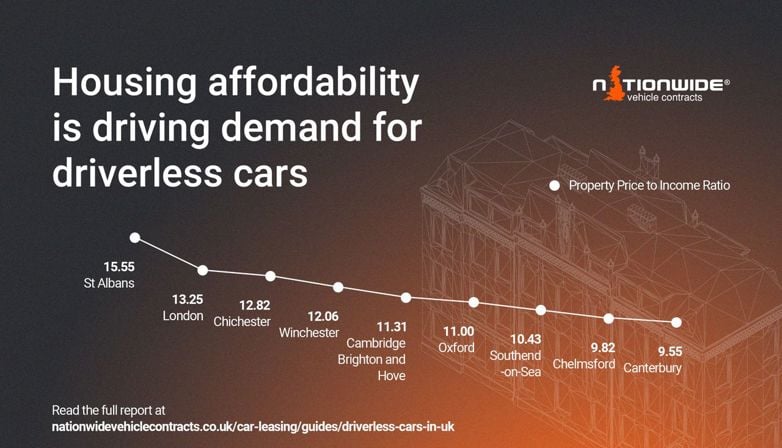
The three cities that achieved the highest ratio of income to property prices, meaning they are home to some of the most expensive properties in the country, making the property ladder even harder to climb.
For example, the average house price in St. Albans was £622,000 in June 2025[6], in London, the average figure is £562,000[7] and in Chichester, £436,000 in July 2025[8]. Therefore, AVs could allow people to move away from the areas without compromised accessibility.
The average working day in the UK is 7.3 hours for full-time workers[9], which is only made longer by commute times, whether by public transport or a car.
A self-driving car would not make the commute less strenuous, but would reduce the number of fatigued drivers behind the wheel, increasing road safety.
As for those whose career puts them behind the wheel more than others, whether that be a business or as a driver, AVs could pave the way to calmer work weeks.
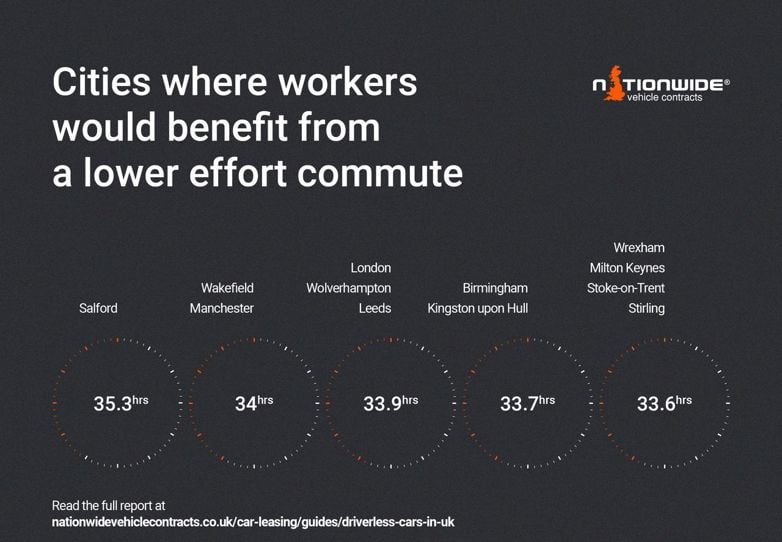
While many might assume Londoners are putting in the longest shift, it's actually Salford residents. Salford employees clock an average of 35 and a half hours per week, which is 1.4 hours more on average than in London.
With its proximity to Manchester, Salford residents are likely to be commuting to the local major city, expressing a further need for AVs to reduce congestion and make commuting less stressful.
Both Manchester and Wakefield employees average 34 hours a week of working, highlighting further demand for smarter, stress-free transport options across the North.
Being able to reclaim commuting time, whether that’s to rest, catch up on life admin or simply avoid driving fatigue, AVs could be transformative in these cities.
Public transport in the UK can bring certain words to Brits' minds: unreliable, chaotic and overpriced, just to name a few.
Train fares in the UK are among the highest in Europe, with a one-way ticket from Edinburgh to London typically costing £100-£200+ for a 4h20 journey[10]. By contrast, flights from the UK to nearby cities like Amsterdam can be as cheap as £17 one-way[11].
Not only are they expensive, but trains in the UK have an average cancellation rate of 5.1% of all scheduled services[12]. Now, introduce AVs, reduced traffic, and reduced fares, and we could have a sensible answer to this overpriced and inconvenient problem.
But which cities are seeing the most train cancellations?
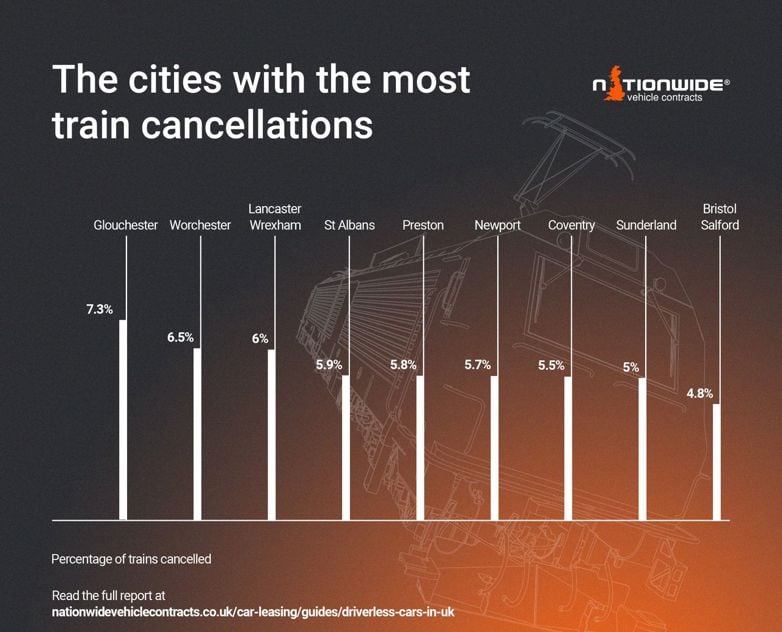
Gloucester has an average train cancellation rate of 7.30%, which is more than the UK average at the end of 2024 (5.1%). There are also almost 30% of trains delayed by more than three minutes, not a reliable method of transport for its residents.
Worcester, Lancaster and Wrexham also sit above average for their cancellation rates, with Lancaster being home to the highest rate of delays in the UK, at an unforgiving 37.1%.
For those relying on trains in these areas, AVs could completely change the way they travel. Driverless cars are not fixed to a schedule and are instead ready on demand, programmed to your direct route, avoiding all the stops along the way.
We know by now that AVs have the power to significantly improve Brits' lives, from commute times to housing, but which UK cities are actually prepared for a rollout when they become readily available?
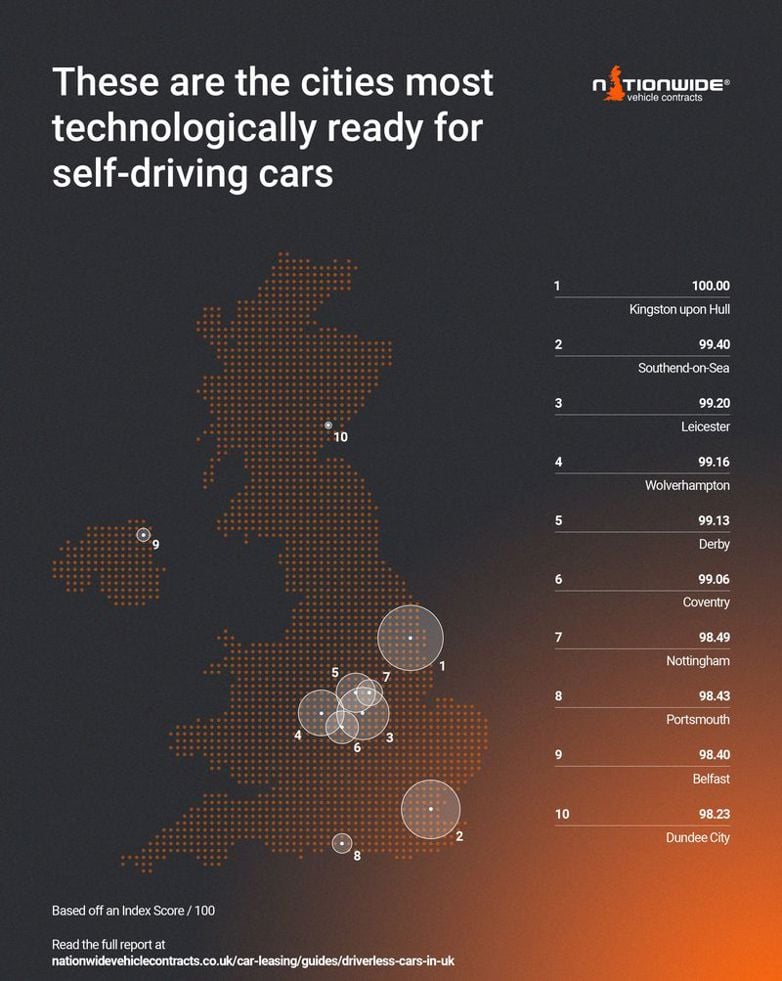
Hull has ranked as the most ready for autonomous vehicles, and it’s lucky because the city also came as the 9th most in need.
Hull would benefit from driverless cars due to the frightening number of road collisions per billion miles, which is 967.75 - the second-highest number in the UK.
But their perfect index score of 100/100 highlights an immediate readiness for the change, thanks to an impressive 5G rollout, Gigabit Capable Broadband and Premises Above 30Mbps.
The same can’t be said for Southend-on-Sea, the coastal city ranked 45th most in need out of the 50 UK cities analysed, thanks to low rates of train delays (5.6%) and cancellations (0.9%).
However, due to the high number of collisions (689.75 per billion miles travelled), the city could truly thrive with autonomous vehicles; they achieved a score of 99 out of 100 thanks to their wireless capabilities and advanced technological connectivity, setting them up perfectly for when AVs roll out.
Leicester may not rank highly among the cities most in need of AVs because of low driving test wait times (15 weeks) and low rate of train cancellations (2.1%), placing 38th out of 50, but that doesn’t mean it shouldn’t embrace them.
With an impressive readiness score of 99/100, the city is well placed to adopt a technology once thought possible only in science fiction.
Director of Nationwide Vehicle Contracts, Keith Hawes, reveals how autonomous vehicles have the potential to future-proof cities across the UK:
“According to the Automated Vehicles Act 2024[13], we can expect to see AVs in the form of buses and taxis as early as spring 2026, with major brands such as Uber already on board.
“This steady rollout aims to increase the confidence of the public and businesses, as well as allow for safety legislation to be passed before mass commercialisation.
“The target for full implementation in the UK currently sits at the second half of 2027, and has the potential to introduce over 38,000 jobs, according to the UK government [14]. This will be revolutionary for the British auto industry and could make our roads the safest they have ever been.”
“When you first hear your city could become home to driverless cars, it can be worrying. However, once these vehicles are rolled out to the mass market, they will have passed all the necessary tests and legislation to make travel safer and easier for everyone.
“For businesses, driverless cars could reduce many common mishaps, such as weather delays, human error, or inconsistent deliveries, helping to improve customer satisfaction and protect your income.
“To prepare, consumers should embrace the change with an open mind, trusting in the technology and regulations designed to create safer roads. On a city-by-city level, preparation goes beyond adequate road surfaces. The market will need to:
Educate the public- Undoubtedly, the public will have a lot of questions about how AVs work and how to use them safely on the roads. That’s why it is important first and foremost to educate the British public on what this means for them and how they can benefit the most from their introduction.
New regulations- Next, new legislation and regulations will be absolutely crucial to ensure liability, allow car owners to update insurance and documentation, and guarantee data privacy for public trust.
Upgrade digital infrastructure- Each UK city will require advanced technologies such as 5G connectivity, new traffic sensors, and smart traffic lights to enable real-time communication with autonomous vehicles (AVs) and certify safety and monitoring.
Reconsider space- Authorities also need to consider space. This could be the repurposing of old parking spaces that are in less demand due to decreased ownership, as well as previous parking and pick-up/drop-off points, which may need to look very different.
The most successful UK cities will be the ones that adapt to the AV industry with open arms and preparation, and treat it as an opportunity to reinvent travel in a smarter, safer, and more sustainable way.”
-
The future of technology can sometimes feel uncertain, especially when your safety is involved. But the UK is set to lead the way in the driverless-vehicle market, paving the way for safer, smarter, and more reliable journeys.
At Nationwide Vehicle Contracts, we’re committed to keeping up with innovation. No matter how the market evolves, our customers will always have access to the latest vehicle technology through our car leasing, in the safest, most up-to-date condition, for an enjoyable driving experience.
Methodology
Nationwide Vehicle Contracts looked at various factors to create a ranking to identify which cities across the UK are the most in need and ready for driverless cars.
We analysed various data metrics to conclude which cities were most in need of driverless cars, including Road Collisions per Billion Miles, Mean Working Hours, Driving Test Wait Time (weeks), Driving Test Pass Rates, % of Population aged 66+, % of Trains 3+ Minutes Late and % of Trains Cancelled.
For the cities that are the most ready, we analysed Gigabit Capable Broadband, 5G Rollout and Premises Above 30Mbps.
- Road Collisions per Billion Miles- Gov.uk
- Mean Working Hours- ONS
- Driving Test Wait Time- BBC
- Driving Test Pass Rates- Gov.uk
- % of Population aged 66+- ONS
- % of Trains 3+ Minutes Late and Cancelled- Data Portal
- Gigabit Capable Broadband- ONS
- Premises Above 30Mbps- ONS
- 5G Rollout- ONS
- Housing Affordability (Price-to-Income ratio)- ONS
- Traffic congestion- TomTom Traffic Index
Sources
- [1] UK self-driving cars- Gov.uk
- [2] Number of crashes caused by human error- National Highway Traffic Safety Administration (NHTSA)
- [3] Number of test backlogs- Driver and Vehicle Standards Agency (DVSA)
- [4] AV market forecast- Statista
- [5] AV Uber rollout- Gov.uk
- [6] Average St. Albans property price- ONS
- [7] Average London property price- Gov.uk
- [8] Average Chichester property price- ONS
- [9] Average working day UK- Statista
- [10] Edinburgh to London train fare- Trainline
- [11] UK to Amsterdam flight fare- Skyscanner
- [12] Average cancellation rate of trains UK- Rail Magazine
- [13]Automated Vehicles Act 2024
- [14]Number of AV jobs to be created in UK- Gov.uk
Guide Information
Originally published: 30th September 2025
